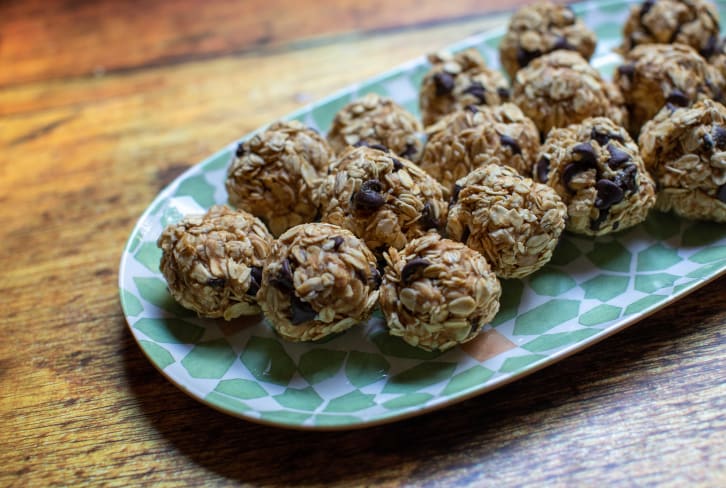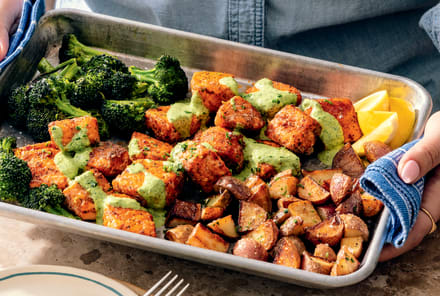Advertisement
How Much Coconut Oil Should You Actually Be Eating?


I've got 99 problems...and coconut oil can cure 91 of them.
It's an internet meme that feels all too real, when so many healthy recipes (including many on this site) call for coconut oil, whether it's for cooking, baking, or making lattes. But how much is too much?
"I always say 'fat's where it’s at,' especially if weight loss is your goal," says Carolyn Brown, a registered dietitian. "I recommend one to two tablespoons of a healthy fat per meal. If this is coconut oil at one or two meals, great!" Jessica Cording, another registered dietitian, has had patients thrive on anywhere from zero to five tablespoons of coconut oil daily.
But what about all of that saturated fat?
Almost all of the fat in coconut oil (refined or unrefined) is saturated, and one tablespoon contains 14 grams, pretty much supplying the amount of saturated fat the American Heart Association recommends people consume daily. Dr. Frank Lipman points out that it's good saturated fat. "Coconut oil is a good saturated fat that has positive metabolic effects," he says.
"Research has shown that the specific types of saturated fats found in coconut oil, medium-chain triglycerides (MCTs), are metabolized differently from other saturated fatty acids because of their difference in structure," Jessica explains. "MCTs have been shown to go straight to the liver from the GI tract, where they're made into ketones, which can be used as an energy source. Ketones have been studied for their therapeutic use in brain disorders1, and a ketogenic diet (which is high in fat and low in carbs and protein) has been used for a long time to treat drug-resistant epilepsy and, more recently, has been shown to have a role in managing symptoms of Alzheimer's, Parkinson's, ALS, and other neurological conditions." For those conditions, Jessica will prescribe a diet higher in coconut oil to benefit from its therapeutic effects. "For people more interested in general wellness, I'm less likely to encourage more than two tablespoons of coconut oil per day."
All those medium-chain fatty acids also mean coconut oil is immediately processed by the liver and turned into energy in your body—in other words, this fat will not make you fat (and studies show it might even help you burn fat2). It's also one of the only food sources of lauric acid, which is also found in breast milk and is renowned for its antiviral, antibacterial, and antifungal properties.
Is there anything about it that's bad?
In an interview with mindbodygreen, Whole Foods Market founder John Mackey expressed his dislike for oil—coconut oil included. "The way I try to get people to understand oil is: What is sugar? You're taking a whole plant food, and you're taking only the carbohydrate out. Oil is the same thing—you're taking the whole plant food, and taking out just the fat," he said. "People are so willing to condemn sugar, but they don't condemn oil, which is pure fat. I'd actually argue that oil is less healthy than sugar. Neither of them has any nutrients in them—if you look at them they're devoid of minerals and phytonutrients. The oil has twice the calories of sugar, so you're getting twice the calories of sugar, with no nutrients or benefits."
Will Cole, a functional medicine practitioner, disagrees. "While going for whole foods is always a good rule to live by, healthy oils have a number of benefits. Coconut oil has beneficial MCT fats that our brains love, increasing cognitive function. Avocado oil is a good source of lutein, a carotenoid to make our eyes healthy. Extra-virgin olive oil is rich with polyphenols and fat-soluble vitamins E and K. Ghee is a great food source of fat-soluble A, D, and K2. These oils have been shown to decrease disease and improve lipid panels."
Dr. Sara Gottfried, a hormone specialist, somewhat agrees with Mackey. "Refined sugar has very different effects in the body compared with oil, particularly on the hormone insulin," she says. "If Mackey's subtext is that we choose to eat oil in a less processed state, such as eating the more oily foods like avocado, coconut, macadamia nuts, and olives, then I agree with only that part of his argument. I'm a whole foodist. I prefer to get my nutrients from the very nourishing foods that are simply prepared, i.e., minimize the processing including the extraction of oil." That said, she does think coconut oil is a health food—but only for some types of people.
"I think coconut oil is a health food for some people with particular genes," she explains. "For instance, if you have the ApoE4 gene, the gene that confers an increased risk of Alzheimer's and heart disease, it may not be the best idea to be adding tablespoon after tablespoon to your latte."
According to Bulletproof diet founder (and good fat-advocate) Dave Asprey, there's one situation you in which should definitely avoid coconut oil. "If you're not eating your vegetables," he says, "coconut oil is bad for you. Coconut oil will escort the bad parts of your gut bacteria into your bloodstream. A tablespoon or two of coconut oil is great—if you eat it with a ton of veggies, you're fine. But if you eat it with whole grains, or sugar, it's likely to have negative effects on your body."
Can you eat too much coconut oil?
In short—yes. "Even with good things, you can have too much of it. Too much coconut oil or any fat source can cause GI upset. We all should eat the amount that is right for our body based on our digestive and gallbladder health and our genetics," says Dr. Cole. Dr. Gottfried uses coconut oil when cooking (she's a fan of its stability at high heats) but doesn't supplement it elsewhere.
Carolyn agrees. "I'm also a big fan of diversifying, so I'd cap it at two to three tablespoons, maximum, per day."
Watch Next
Enjoy some of our favorite clips from classes
Enjoy some of our favorite clips from classes
What Is Meditation?
Mindfulness/Spirituality | Light Watkins
Box Breathing
Mindfulness/Spirituality | Gwen Dittmar
What Breathwork Can Address
Mindfulness/Spirituality | Gwen Dittmar
The 8 Limbs of Yoga - What is Asana?
Yoga | Caley Alyssa
Two Standing Postures to Open Up Tight Hips
Yoga | Caley Alyssa
How Plants Can Optimize Athletic Performance
Nutrition | Rich Roll
What to Eat Before a Workout
Nutrition | Rich Roll
How Ayurveda Helps Us Navigate Modern Life
Nutrition | Sahara Rose
Messages About Love & Relationships
Love & Relationships | Esther Perel
Love Languages
Love & Relationships | Esther Perel
What Is Meditation?
Box Breathing
What Breathwork Can Address
The 8 Limbs of Yoga - What is Asana?
Two Standing Postures to Open Up Tight Hips
How Plants Can Optimize Athletic Performance
What to Eat Before a Workout
How Ayurveda Helps Us Navigate Modern Life
Messages About Love & Relationships
Love Languages
Advertisement

These Peanut Butter Cup Protein Bites Make The Perfect On-The-Go Snack
Molly Knudsen, M.S., RDN










